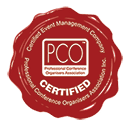When you hear the term ‘online event’ it often conjures up an image of a free webinar where you struggle to pay attention to the sole presenter talking tediously about a subject that may or may not be relevant to you! To quote Trevor Gardiner, CEO of EventsAIR, “webinars are the junk food of the meetings and events industry”, so if you’re considering hosting a virtual conference, don’t be afraid of charging participants a fee to attend.
In reality and with recent digital and technological advancements, a virtual conference is far from a webinar. These online events include varying components and may have thousands of live participants watching and interacting in live or on-demand presentations, workshops, networking events, exhibitions, ePoster sessions and much more, providing extensive learning opportunities and audience engagement. A carefully considered registration fee or ticket pricing strategy is vital and there are a number of key considerations to take into account.
Considerations
- Delivering engaging and interactive solutions that go way beyond that of just a webinar should be a consideration of every virtual conference. What you charge sets the benchmark for its value in people’s minds. You don’t want to devalue your content by making the ticket price too low, but you should also factor in the savings made on not having physical expenses such as travel, venue hire and catering. When moving a traditional face-to-face event to a virtual format, a reduction in the registration fee of 20% to 30% is often appropriate. This retains perceived value for content (the primary reason for delegates attending).
- Virtual attendees do not have to spend money on travel, accommodation or meals, a drawcard for those participants that may have previously sat on the fence about registering and attending. Consider session capacities and contingencies for more (and also less) delegates than you would expect.
- Who does what? Don’t forget to factor in the requirements and cost out the entire planning process, including pre-production, the virtual event itself, and the post-event on-demand streaming platform.
- Even though there may be no need for a physical venue (such as a hotel or convention centre), meaning no traditional audio visual costs either, online technical support is still critical. Have you included this in your budget and considered your capability to provide this support internally, or the need to outsource to professionals?
- It takes a lot of time to organise and run an online event. Liaising with speakers, dealing with abstracts and posters, coordinating sessions, and collaborating with sponsors and exhibitors is vital for a successful virtual event. You don’t want to underestimate your time and value.
- What additional costs do you need to plan for? Are there licences for third party streaming platforms such as Twilio, Zoom and Vimeo that you need to subscribe to?
- How have you adapted the sponsorship and marketing packages on offer? Does your virtual conference or event present a better opportunity for sponsors who have the ability to engage in online meeting rooms and a virtual exhibitor platform? How does the cost of your sponsorship packages reflect this?
- The lead time for planning a virtual event or meeting can be the same as it is for a physical event. Make sure you have plenty of time to coordinate all of the virtual components and start promoting the conference (and the registration fees) well in advance.
Still not sure? Don’t hesitate to reach out to Expert Events for advice on managing your next event.






